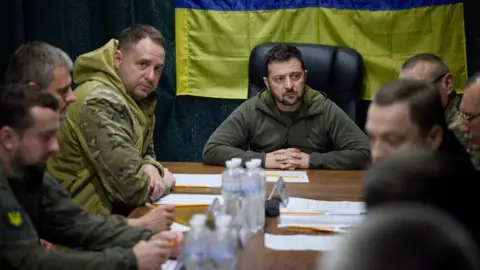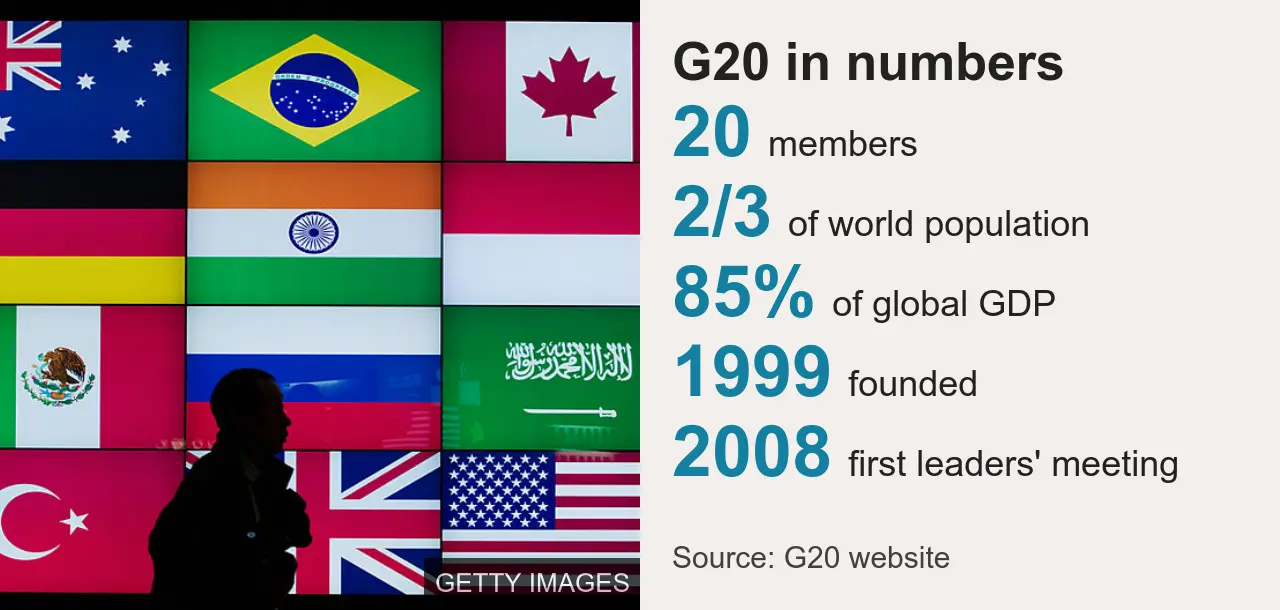Ukraine: Zelensky snubs Russia as he addresses 'G19' at G20
 EPA
EPAUkrainian President Volodymyr Zelensky called on "G19" world leaders to end the Russian invasion, in a pointed snub to Moscow at the G20 summit.
Mr Zelensky appeared in a video speech beamed to leaders gathered for the summit in Bali, Indonesia.
Russia is a G20 member but President Putin is not in Bali, sending his Foreign Minister Sergei Lavrov instead.
Mr Zelensky also pleaded for an extension of a Ukrainian grain export deal due to expire soon.
A draft G20 declaration, seen by news agencies, said "most" countries strongly condemned the Ukraine war and agreed it was exacerbating fragilities in the global economy.
It also stressed that the use or threat of nuclear weapons was "inadmissible".
Mr Lavrov said the declaration had been "politicised" by Ukraine's Western allies.
In his speech, President Zelensky said: "I am convinced now is the time when the Russian destructive war must and can be stopped."
He outlined a number of strategies, including ensuring nuclear and food safety, the ending of hostilities, and a prevention of escalation.
He repeatedly addressed the leaders as the "G19", excluding Russia.
Chief among his requests was an extension of what is known as the Black Sea Grain Initiative which was struck in July between the United Nations and Russia.
It ensured that food exports blocked at Ukrainian ports by Russian warships could be shipped out.
The UN says since the deal began, 10 million tonnes of grain and other food have been exported, preventing a global food crisis.
But the deal expires on 19 November. Mr Zelensky said the deal should be extended indefinitely, "no matter when the war ends".
"The right to food is a fundamental right of every person in the world," he said, proposing to expand the deal to other ports in the Mykolaiv region.
Russia said on Saturday that there had yet to be any agreement to extend the deal.
In return for allowing Ukraine to ship out food, it has insisted that Western sanctions be lifted so Russia can export its own food and fertilisers to world markets without hindrance.

Mr Zelensky also accused Russia of trying to "turn the cold into a weapon against millions of people" by bombing key Ukrainian energy infrastructure as winter approaches.
He asked for additional military assistance from Ukraine's allies, and price restrictions on Russian energy exports such that Russia cannot profit from them.
"If Russia is trying to deprive Ukraine, Europe and all energy consumers in the world of predictability and price stability, the answer to this should be a forced limitation of export prices for Russia…
"That's fair. If you take something away, the world has the right to take from you," he said.
Russia has shut off its Nord Stream 1 gas pipeline to Europe, while the opening of a second pipe has been stopped by the West.
Elsewhere in his speech Mr Zelensky - who had just returned from the recaptured Ukrainian city of Kherson - likened its liberation to "D-Day, the landing of the Allies in Normandy" during World War Two.
"It was not yet a final point in the fight against evil, but it already determined the entire further course of events. This is exactly what we are feeling now," he said.
Later in the day, Mr Lavrov gave a news conference to Russian media, where he blamed Ukraine for hampering settlement with Russia.
He accused Ukraine of "categorically refusing negotiations and putting forward conditions that are obviously unrealistic".
When asked about whether he had secured support from any countries at the G20 summit, he said "no one except the West and its closest satellites has joined anti-Russian sanctions".
The Ukraine war cast a long shadow over the first day of the G20 leaders' summit, featuring as a theme in several meetings.
In a meeting with Chinese leader Xi Jinping, French President Emmanuel Macron stressed the conflict "must be overcome by close coordination between France and China".
A readout from the French side said the two countries respect the "territorial integrity and sovereignty of Ukraine" and Mr Xi "gave his support" to Mr Macron's peace efforts.
In contrast, a readout from the Chinese side released to state media did not mention Ukraine at all. It made a vague reference to the conflict by acknowledging the world was entering "a new period of turmoil and change".
UK Prime Minister Rishi Sunak also spoke directly to Mr Lavrov in his opening remarks at the summit - the first time a British leader has confronted a senior Russian figure face to face since the war began.
He said the "Putin regime…has stifled domestic dissent and fabricated a veneer of validity only through violence" and is hearing "a chorus of global opposition to its actions".

